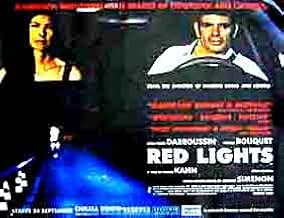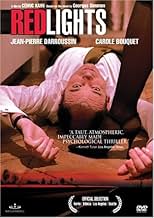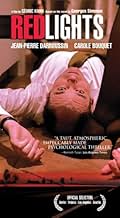Feux rouges
- 2004
- Tous publics
- 1h 45m
IMDb RATING
6.6/10
3.1K
YOUR RATING
A cross-country trip turns out to be a nightmare for a troubled couple.A cross-country trip turns out to be a nightmare for a troubled couple.A cross-country trip turns out to be a nightmare for a troubled couple.
- Awards
- 2 nominations total
Featured reviews
Opens with brilliantly shot sequences and if it then moves into more traditional French bourgeoisie territory it does it with passion and intelligence. As the narrative unfolds, involving a car drive that begins tetchy and proceeds to become really scary, we identify with the main protagonists and are as concerned as the male lead when the other disappears. A lot of the first part of the film is shot through the front screen of the car but this is so well done with the accompanying dialogue, developing tragedy and suspense we are almost on the edge of our seats. We lurch into nightmare territory and things become almost unbearable as we struggle to assure ourselves as to what is really happening. I was not as interested as the director in the relationship between the high flying wife and the husband who sees himself as her poodle and presumably this is why I found the ending simplistic and verging on the insulting, but never mind a good ride up to then!
Red Lights is like a bad dream you might have if you nodded off over the wheel during a long car journey, with the roar of the motorway and the crunch of tyres on gravel seeping into your subconscious. It's so ambient, it would work just as well as a radio play. En route to collecting their kids from summer camp, 'married alive' couple Antoine (Pierre-Darroussin) and Helene (Bouquet) bicker in the car, as Antoine accuses her of cramping his style. The only way this sad little man can assert himself is to pull over and slug whisky after whisky in every roadside bar. When his furious wife bails out to catch the train instead, it's the start of one of those Long Dark Nights of the Soul for both parties. 'I got sick of playing the good little doggie', Antoine tells his mysterious hitchhiker, in one of the movie's most memorable exchanges. 'You're like my doggie,' sneers his passenger. 'Always thirsty.' 'Where's your dog?' 'He's dead
' Based on the Georges Simenon novel, here's a dark little number, blackly comic, and as searing as the red neon lights that accompany each pit stop on the road to Hell.
Red Lights is a strange, abstract, almost existential exercise in movie making. Adapted from the 1953 novel by Georges Simenon and set to Debussy's elegantly creepy Nuages, writer-director Cedric Kahn offers up movie with attributes of a Hitchcockian suspense thriller.
The feeling of foreboding begins immediately when we meet Antoine Dunant (Jean-Pierre Darroussin a low-level insurance executive. He's just leaving his job to meet his beautiful wife Hélène (Carole Bouquet) in a local café. They are planning to drive to the countryside from Paris to pick up their kids from summer camp.
But as soon as Antoine gets to the café he guzzles three beers back to back with one eye on the street lest his wife arrive before he's suitably fortified. It soon becomes pretty obvious that their marriage is far from happy - Antoine armed with enough drink to sink an elephant, settles into a manner of truculent impetuosity, while Helene remains detached, cold, and almost abusive.
While in the road, Helen discovers that her husband is utterly plastered. She hardly says anything as he weaves all over the road, but her silence speaks volumes. Thus starts a trip of barely controlled hostility with the husband clenching the wheel and brooding, while the wife fumes beside him. Both are so busy bickering with each other and thinking dark thoughts that they're half oblivious to news reports of an escaped convict on the loose nearby.
Antoine isn't usually a drinker, but something has snapped in him, and as the neon signs of the roadside bars start to beckon him, he becomes obsessed with downing as much cold beer and whisky as he can. He leaves Helene angrily waiting in the car while he goes into yet another bar, to prepare himself for the long night ahead.
Hélène, freaked by his increasing belligerence and inability to drive in a straight line, abandons her husband to look for a train station. Meanwhile Antoine strikes up a conversation with a reserved one-armed stranger (Vincent Deniard).
When, minutes later, the stranger steps out of the parking-lot shadows, his face half hidden by the hood of a sweatshirt, and asks for a ride, the cocky, staggering Antoine doesn't even break stride. By now he's so sweaty and drunk that he waves the fellow right into the car.
What follows is detour into a night of terror for Antoine, Helene, and for the viewer. The movie starts to resemble everyone's nightmare - the inexplicable disappearance of a loved one. And as Antoine embarks on a desperate journey to track his wife down, it soon becomes clear that Red Lights is really showing us a portrait of a marriage, a marriage that has been enigmatically hanging by a thread.
Their need to see the children again is probably just a way of distracting them from the aridness of their relationship. She's beautiful and accomplished, while he plain and dull. Somehow the couple began their marriage as equals, but she soon eclipsed him, for which he can't forgive her. Other than this, Kahn provides very little reason as to why their relationship has suddenly gone sour.
What Kahn does provide, however, is the knowledge that marriage can often dissipate completely, leave two strangers in a car, totally sick of each other, in desperate need of a reviving shock to the system. But when the sun finally rises, and Antoine is released from his drunken hell, Kahn does provide a dash of hope for the couple.
In the end, Red Lights is showing that relationships are frail and that the machinations of marriage are often inexplicable. And if nothing else, Antoine and Helen show that it can all dramatically and irrevocably change and fall apart in a searing flash of red light. Mike Leonard September 05.
The feeling of foreboding begins immediately when we meet Antoine Dunant (Jean-Pierre Darroussin a low-level insurance executive. He's just leaving his job to meet his beautiful wife Hélène (Carole Bouquet) in a local café. They are planning to drive to the countryside from Paris to pick up their kids from summer camp.
But as soon as Antoine gets to the café he guzzles three beers back to back with one eye on the street lest his wife arrive before he's suitably fortified. It soon becomes pretty obvious that their marriage is far from happy - Antoine armed with enough drink to sink an elephant, settles into a manner of truculent impetuosity, while Helene remains detached, cold, and almost abusive.
While in the road, Helen discovers that her husband is utterly plastered. She hardly says anything as he weaves all over the road, but her silence speaks volumes. Thus starts a trip of barely controlled hostility with the husband clenching the wheel and brooding, while the wife fumes beside him. Both are so busy bickering with each other and thinking dark thoughts that they're half oblivious to news reports of an escaped convict on the loose nearby.
Antoine isn't usually a drinker, but something has snapped in him, and as the neon signs of the roadside bars start to beckon him, he becomes obsessed with downing as much cold beer and whisky as he can. He leaves Helene angrily waiting in the car while he goes into yet another bar, to prepare himself for the long night ahead.
Hélène, freaked by his increasing belligerence and inability to drive in a straight line, abandons her husband to look for a train station. Meanwhile Antoine strikes up a conversation with a reserved one-armed stranger (Vincent Deniard).
When, minutes later, the stranger steps out of the parking-lot shadows, his face half hidden by the hood of a sweatshirt, and asks for a ride, the cocky, staggering Antoine doesn't even break stride. By now he's so sweaty and drunk that he waves the fellow right into the car.
What follows is detour into a night of terror for Antoine, Helene, and for the viewer. The movie starts to resemble everyone's nightmare - the inexplicable disappearance of a loved one. And as Antoine embarks on a desperate journey to track his wife down, it soon becomes clear that Red Lights is really showing us a portrait of a marriage, a marriage that has been enigmatically hanging by a thread.
Their need to see the children again is probably just a way of distracting them from the aridness of their relationship. She's beautiful and accomplished, while he plain and dull. Somehow the couple began their marriage as equals, but she soon eclipsed him, for which he can't forgive her. Other than this, Kahn provides very little reason as to why their relationship has suddenly gone sour.
What Kahn does provide, however, is the knowledge that marriage can often dissipate completely, leave two strangers in a car, totally sick of each other, in desperate need of a reviving shock to the system. But when the sun finally rises, and Antoine is released from his drunken hell, Kahn does provide a dash of hope for the couple.
In the end, Red Lights is showing that relationships are frail and that the machinations of marriage are often inexplicable. And if nothing else, Antoine and Helen show that it can all dramatically and irrevocably change and fall apart in a searing flash of red light. Mike Leonard September 05.
The first thing to take note in Red Lights is that the story is not rushed: Antoine (Jean-Pierre Darrousin) is perhaps a passive-aggressive, or maybe just having a mid-life crisis. He and his wife Helene are planning for a trip to pick up the kids from summer camp. But the drive hits some things in the way- he has a beer and a whiskey before leaving; a traffic jam gets to Antoine; he drinks again at a roadside; he and his wife bicker; he drinks again; she leaves, and once he realizes he can't catch up with her, he decides to have a night with a little more drinking ahead. While he says he doesn't drink too often ("two, three times a year", he says), this night is different. Especially with a fugitive somewhere out on the loose, as the radio says.
Cedric Kahn is a skilled and trust-worthy director (via France) for a few reasons in dealing with his latest film Red Lights. He doesn't make the pace in the tenser scenes (with a couple of juicy exceptions) really quick cut like in a choppy Hollywood piece. He brings an interesting blend of visuals with the city and the roads, the cars, then as it grows darker outside, the lights outside become key. When Antoine awakes the next morning on the roadside, he's out in the country. As well, he has a great blend of music from Debusy, whom I may have heard before this film but never recognized. It's a fascinating element to add with the impending doom of the film's story. But the key thing that the director can do for a film is the right casting, and here's it's impeccable in dealing with the three leads. Jean-Pierre Darrousin is terrific at conveying the mind-set of this husband in a rocky relationship. Then in the second and third acts, despite what he's doing on the road, he keeps consistent in keeping as the film's reluctant hero. Credit should also be given to first-time actor Vincent Deniard, who is perfect at being the "quiet one you got to watch". And Carole Bouquet is a fair counterpart to a Darrosin.
Although the denouement starts to drag, for my money the film's main chunk doesn't. It would be one thing if Antoine just got drunk. But there's also a good interest in the talking points with the character, as he decides to blow his mind in the process. Red Lights is definitely an art-house film that won't please everyone (the film ends rather realistically, without the kind of extra bit American audiences might want that's more intimate here), but it's still very compelling.
Cedric Kahn is a skilled and trust-worthy director (via France) for a few reasons in dealing with his latest film Red Lights. He doesn't make the pace in the tenser scenes (with a couple of juicy exceptions) really quick cut like in a choppy Hollywood piece. He brings an interesting blend of visuals with the city and the roads, the cars, then as it grows darker outside, the lights outside become key. When Antoine awakes the next morning on the roadside, he's out in the country. As well, he has a great blend of music from Debusy, whom I may have heard before this film but never recognized. It's a fascinating element to add with the impending doom of the film's story. But the key thing that the director can do for a film is the right casting, and here's it's impeccable in dealing with the three leads. Jean-Pierre Darrousin is terrific at conveying the mind-set of this husband in a rocky relationship. Then in the second and third acts, despite what he's doing on the road, he keeps consistent in keeping as the film's reluctant hero. Credit should also be given to first-time actor Vincent Deniard, who is perfect at being the "quiet one you got to watch". And Carole Bouquet is a fair counterpart to a Darrosin.
Although the denouement starts to drag, for my money the film's main chunk doesn't. It would be one thing if Antoine just got drunk. But there's also a good interest in the talking points with the character, as he decides to blow his mind in the process. Red Lights is definitely an art-house film that won't please everyone (the film ends rather realistically, without the kind of extra bit American audiences might want that's more intimate here), but it's still very compelling.
A decent but ultimately disappointing thriller. It feels like slow-moving imitation Clouzot, with elements from Les Diaboliques ("What really happened?"), The Wages of Fear (high tension on a long drive), and Quai des Orfevres (a similar plot point I don't want to reveal here).
With tighter editing, "Feux rouges" could have been a much stronger movie. It does contain a number of memorable scenes, especially those involving the protagonist and his second passenger. Not a bad film at all, but it doesn't deserve the rave reviews it has drawn from several major critics.
7/10
With tighter editing, "Feux rouges" could have been a much stronger movie. It does contain a number of memorable scenes, especially those involving the protagonist and his second passenger. Not a bad film at all, but it doesn't deserve the rave reviews it has drawn from several major critics.
7/10
Did you know
- GoofsAt the beginning of the movie, the main characters meet at a cafe in the late afternoon. They then go home and get ready to travel to Bordeaux to pick up their kids. On the trip to Bordeaux, they are stuck in heavy traffic. Although it is now early evening, the vertical shadows cast by the cars indicate that the traffic scenes were shot at mid-day.
- ConnectionsEdited into Le documentaire culturel: Le siècle de Simenon (2014)
- SoundtracksNuages
from "Nocturnes"
Written by Claude Debussy
Performed by Etienne Baudo and LOrchestre de l'Opéra national de Paris
Conducted by Manuel Rosenthal
- How long is Red Lights?Powered by Alexa
Details
- Release date
- Country of origin
- Official site
- Languages
- Also known as
- Red Lights
- Filming locations
- Cléré les Pins, France(The garage where Antoine has his tyre changed.)
- Production companies
- See more company credits at IMDbPro
Box office
- Gross US & Canada
- $673,828
- Opening weekend US & Canada
- $3,202
- Aug 22, 2004
- Gross worldwide
- $2,394,429
- Runtime1 hour 45 minutes
- Color
- Sound mix
- Aspect ratio
- 1.85 : 1
Contribute to this page
Suggest an edit or add missing content























